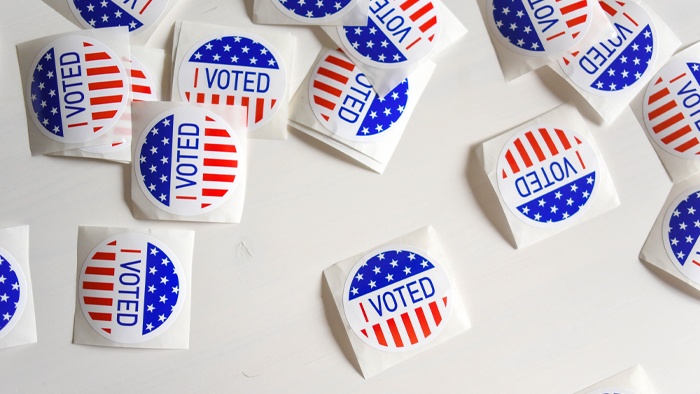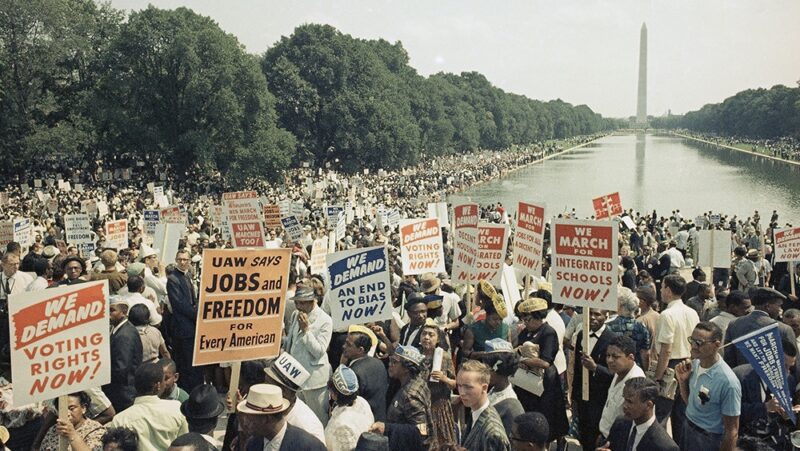Perspective: Protect Voting Like We Protect Free Speech

The First Amendment protects many activities related to voting — expressing political views near polling stations, signing petitions to put initiatives on a ballot, receiving news coverage on the various candidates. But it stops short of protecting voting itself. The right to express ourselves freely is far more protected under the law than the right to vote, which is strange considering voting is a fundamental expression of our views. Our First Amendment freedoms enable us to figure out what changes we, as a society, want, and the most effective way of enacting those changes is by voting.
As of June 2021, 17 states have enacted 28 new laws that place a number of burdens on people who want to exercise their right to vote — among other things, by making it harder to register, by reducing vote-by-mail and early voting opportunities and by allowing partisan poll watchers to challenge the eligibility of voters without any grounds. As Garrett Epps wrote back in 2013 (also a notoriously bad year for voting rights), “Neither the American people nor the federal courts would tolerate restrictions of this sort if they were imposed on free speech, free assembly, freedom of religion, or freedom to petition the government for redress of grievances.”
“It seems like an obvious proposition that a citizen registering to vote or casting a ballot is engaging in free speech, a fundamental right entitled to full protection under the First Amendment.” – voting rights lawyers Armand Derfner and J. Gerald Herbert
As voting rights lawyers Armand Derfner and J. Gerald Herbert have written, “It seems like an obvious proposition that a citizen registering to vote or casting a ballot is engaging in free speech, a fundamental right entitled to full protection under the First Amendment … But the current Supreme Court rarely scrutinizes voting regulations as it does other speech regulations.” Even if you don’t consider voting to be speech, it does seem strange that the two concepts are considered so differently under the law. It’s hard to argue that they’re so unrelated to one another when there’s actually quite a bit of overlap between them — in fact, some of the anti-voter laws passed by state legislatures also implicate First Amendment rights.
Laws limiting voting limit speech too
Just look at Georgia’s recently passed voting bill. Civil rights and church groups have argued the draconian law that makes it a crime for volunteers to give water to voters waiting in line at the polls interferes with “the type of interactive communication concerning political change that is appropriately described as ‘core political speech.’” The Georgia First Amendment Foundation has characterized the state’s new limitations on observing and photographing important aspects of elections as “vaguely defined criminal laws that would potentially punish routine, constitutionally-protected newsgathering by journalists and interested citizens.”
Nonprofit civic engagement organizations have challenged the law’s many restrictions around distributing absentee ballot applications to voters as severe burdens on their rights to engage in speech that encourages political participation. It should be clear from these examples that voting doesn’t happen in a vacuum — it’s the culmination of many acts of speech, press, petition and association.
Alternate Viewpoint: U.S. Sen. Tim Scott Defends Georgia Voting Law
We place time, place and manner restrictions on First Amendment rights all the time. The government can require you to get a permit in order to hold a rally in a public park, for example. So how is placing restrictions on where, when and how someone can vote any different? It’s true that none of our rights is unlimited.
Court weighs speech and voting differently
Almost every case involving civil rights requires courts to weigh an individual’s rights against the government’s reasons for passing a law or policy that limits those rights. But as the Supreme Court’s 2020-2021 term clearly illustrates, the court puts its thumb on the scale in different places for different rights. In Americans for Prosperity v. Bonta, the court sided with nonprofits and their donors who wished to be anonymous, placing their rights to speech and association over California’s argument that it needed nonprofits to disclose the names of their largest donors in order to prevent charity fraud. The court said that California didn’t do enough to prove that it truly needed donor disclosures to investigate potential fraud. The lesson you might take from this is that when the state is going to do something that will deter people from exercising their rights, it had better be able to prove that it’s absolutely necessary. But you’d be wrong. That rubric changes completely when it comes to voting rights.
In Brnovich v. Democratic National Committee, the plaintiffs argued that the state of Arizona violated the Voting Rights Act by passing election laws that disproportionately impacted voters of color. The state of Arizona argued that these laws were necessary to prevent election fraud. The Supreme Court sided with Arizona. What did Arizona have to do to prove that its laws were necessary to prevent the fraud in question? Nothing, really. The court didn’t require evidence that these laws were necessary to prevent election fraud in Arizona. It didn’t even require evidence that there was any election fraud in Arizona.
As an analysis from The Atlantic lays out, “The fundamental question in the case is whether the states or voters of color ought to have the benefit of the doubt,” and this decision makes it clear that the Supreme Court gives that to the states. Contrast that with what Chief Justice Roberts once wrote about weighing government interests against speech rights: “Where the First Amendment is implicated, the tie goes to the speaker, not the censor.”
Alternate Viewpoint: Supreme Court Got It Right in Arizona Voting Law Decision
Too many of us consider the freedoms of the First Amendment to be rights guaranteed to all, but the freedom to vote a privilege that only a select few should be able to enjoy without difficulty. A Texas legislator even said, “[V]oting is not supposed to be easy. That’s what our men died for,” as if Americans went to war to ensure that their democracy would represent fewer of us. But there’s little sense in protecting all the steps leading up to voting, only to abandon all concern about protecting the act of voting itself.
Lata Nott is a fellow for the First Amendment at the Freedom Forum. Follow her on Twitter at @LataNott.
20 of the Most Famous Protests In U.S. History
Free Expression or Infringement? 10 Famous Copyright Cases to Know
Related Content

